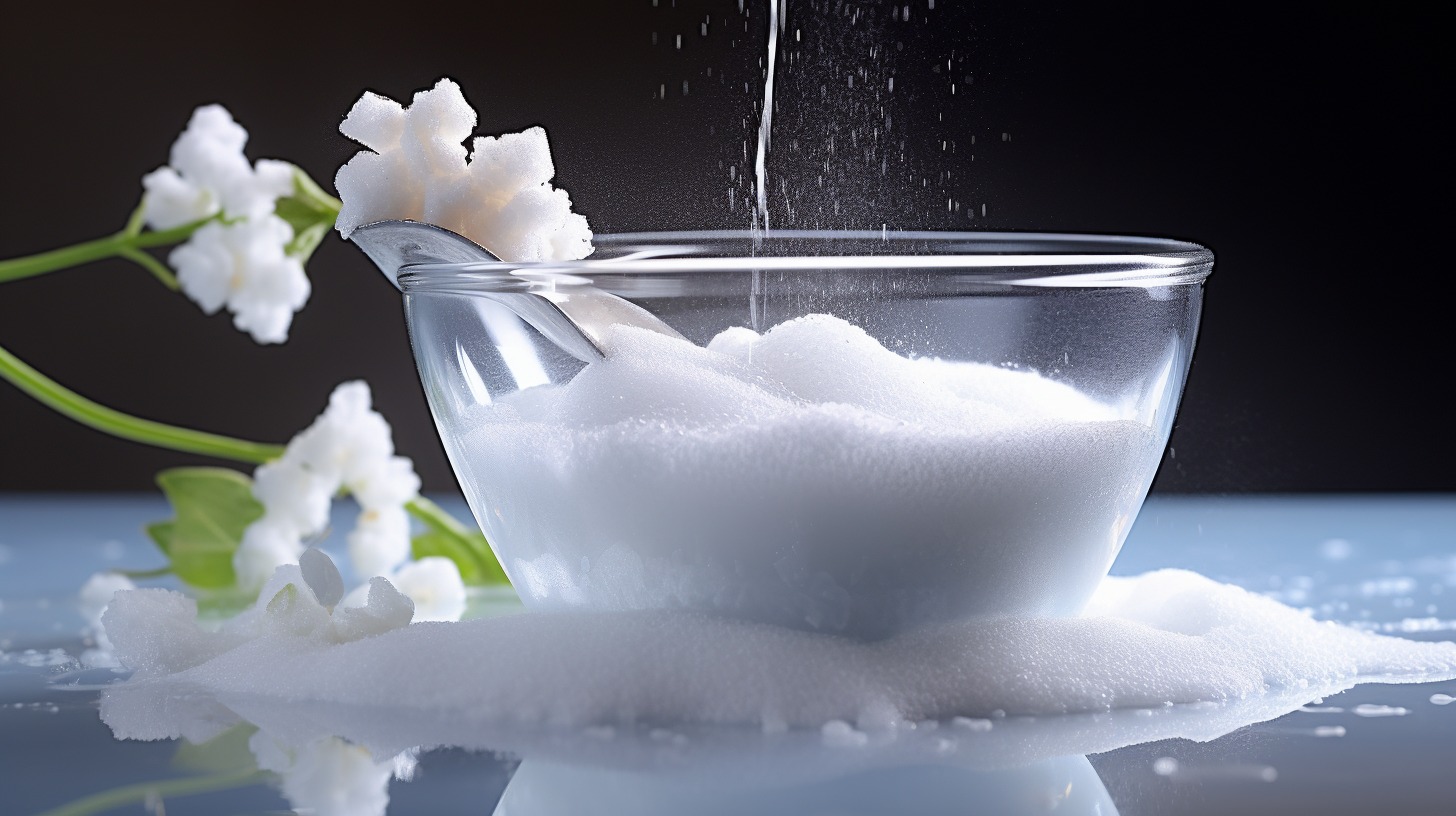Xylitol, a sugar alcohol naturally found in small amounts in various fruits and vegetables, is gaining popularity as a sugar substitute. Unlike the traditional variant, this option is known for its low-calorie and low-glycemic properties.
Typically used in sugar-free chewing gums, mints, and diabetic-friendly foods, xylitol offers a sweet taste similar to sucrose but with approximately 40% fewer calories. Chemically, it differs from other options like sorbitol and mannitol due to its unique structure, which significantly influences its metabolic effects.
The rise in popularity of xylitol is partly due to the increasing demand for healthier alternatives, driven by the global rise in conditions like obesity and diabetes. Today, I want to provide you with the most important things you should know about Xylitol.
The Impact on Blood Sugar and Insulin Levels
Xylitol’s influence on blood sugar and insulin levels is a key factor in its appeal as a quality sugar substitute. Xylitol’s appeal as a substitute is largely due to its low glycemic index, which ensures that it does not cause rapid spikes in blood glucose levels after consumption.
This feature is particularly important for individuals with diabetes or those looking to control their blood sugar levels.
Glycemic Index and Impact on Blood Glucose Levels:
- Xylitol has a significantly lower glycemic index compared to regular sugar.
- The glycemic index (GI) measures how much a carbohydrate-containing food raises blood glucose levels.
- While sugar has a GI of around 65, xylitol’s GI is estimated to be about 7 to 13. This lower GI means xylitol causes a much slower and lower rise in blood glucose.
Absorption Rate and Glucose Release:
- The body absorbs xylitol at a slower rate than sugar.
- This slower absorption rate results in a gradual release of glucose into the bloodstream, rather than a sharp increase.
- This property makes xylitol advantageous for maintaining more stable blood sugar levels, which is particularly beneficial for people with diabetes.
Insulin Response:
- Unlike sugar, which requires insulin for its metabolism, xylitol is metabolized with minimal insulin.
- This is an important consideration for individuals with insulin resistance or type 2 diabetes, as it can help in managing their condition more effectively.
Comparative Impact on Blood Glucose Levels:
- Although xylitol has a lower impact on blood glucose levels than sugar, it is not completely without effect.
- Some studies suggest a mild increase in blood glucose levels with xylitol consumption, but these increases are significantly less than those caused by sugar.
| Factor | Xylitol | Regular Sugar (Sucrose) |
|---|---|---|
| Glycemic Index (GI) | 7-13 (Low) | ~65 (Medium) |
| Absorption Rate | Slower, leading to gradual release | Faster, rapid spike |
| Effect on Blood Glucose | Minimal increase | Significant increase |
| Insulin Requirement | Minimal | Required |
Comparison with Other Substitutes
Now, let us compare Xylitol with other sugar substitutes.
Erythritol
Erythritol, like xylitol, is a sugar alcohol with distinct characteristics. It contains zero calories and does not impact blood sugar levels, making it an excellent choice for individuals with diabetes. However, erythritol can cause digestive issues, such as bloating and diarrhea, when consumed in large amounts, similar to other options.
Stevia
Stevia, derived from the Stevia leaves, is a zero-calorie, non-nutritive sweetener. It’s significantly sweeter than sugar, and research has shown that it does not affect blood glucose or insulin levels, which is beneficial for diabetics. The taste of stevia can vary greatly, with some people finding it less palatable than xylitol due to its somewhat bitter aftertaste.
Sorbitol
Sorbitol, another sugar alcohol, provides fewer calories than sugar but has a higher glycemic index compared to xylitol and erythritol. This could lead to a more substantial impact on blood sugar levels, making sorbitol a less ideal choice for people with diabetes or those who need to closely monitor their blood glucose levels.
Saccharin
Saccharin is one of the oldest artificial sweeteners and is calorie-free. It is much sweeter than sugar but has been subject to controversy over the years due to health concerns, although regulatory agencies have deemed it safe for consumption. Some people may notice a metallic aftertaste with saccharin, which can affect its palatability.
Sucralose
Sucralose, marketed under the brand name Splenda, is another popular artificial sweetener. It does not contain calories and does not have a significant impact on blood glucose, making it a suitable option for diabetics. Unlike some other artificial sweeteners, sucralose can withstand high temperatures, making it favorable for cooking and baking.
Benefits of Xylitol
Xylitol is celebrated for its numerous health benefits, and I would like to discuss the most important ones with you. Let us go.
Caloric Content and Weight Management
With only 2.4 calories per gram, xylitol provides nearly half the calories of sugar, making it a valuable component in weight management diets.
When substituting sugar with xylitol, individuals can significantly reduce their overall caloric intake, which can be beneficial for weight loss or maintaining a healthy weight. This lower caloric value, combined with its sweet taste, allows for a reduction in energy intake without sacrificing the sweetness in foods and beverages.
Dental Health Benefits
Xylitol’s role in dental health is well-documented. Its non-fermentable nature prevents it from being metabolized by oral bacteria, reducing the risk of tooth decay. Additionally, it can inhibit the growth of Streptococcus mutans, the primary bacterium associated with dental cavities.
This characteristic makes xylitol an effective ingredient in dental care products like toothpaste and chewing gum, promoting oral hygiene and preventing dental caries.
Prebiotic Properties and Gut Health
Xylitol’s prebiotic properties are another remarkable benefit. Since it is not completely absorbed in the intestine, it travels to the colon where it promotes the growth of beneficial gut bacteria. This action can enhance gastrointestinal health, potentially improving digestion and boosting the immune system.
The promotion of a healthy gut flora through consumption can be an essential factor in maintaining overall health and well-being. In this regard, it shares the benefits with agave nectar.
Prevention of Infections
Xylitol has been shown to have applications beyond dietary benefits, such as in the prevention of certain infections. For example, studies indicate that regular intake of xylitol, especially in forms like chewing gum, can reduce the incidence of acute middle ear infections (otitis media) in children.
This benefit is attributed to xylitol’s ability to inhibit bacteria that can lead to these infections.
Potential Side Effects and Concerns
While xylitol offers several health benefits, it’s also associated with certain side effects, especially when consumed in large quantities.
Digestive Health Issues
The most commonly reported side effect is its impact on digestive health. As a sugar alcohol, xylitol is not fully absorbed in the small intestine, leading to a higher concentration in the large intestine. This can cause an osmotic effect, drawing water into the gut and leading to diarrhea, gas, and bloating.
These symptoms are particularly pronounced in individuals not accustomed to xylitol or other sugar alcohols. Additionally, for some people, xylitol can act as a fermentable substrate for gut bacteria, leading to increased gas production and discomfort.
Allergic Reactions
Though rare, some individuals may experience allergic reactions to xylitol. Symptoms of an allergic reaction can include itching, hives, and in rare cases, anaphylaxis. Anyone experiencing these symptoms after consuming xylitol should seek immediate medical attention.
Laxative Effects
Due to its sugar alcohol content, xylitol can have a laxative effect, particularly when consumed in large amounts. It can lead to an increase in bowel movements and discomfort, especially for individuals with sensitive digestive systems or those who are not used to sugar alcohols.
Interactions with Other Medications
It can interact with certain medications, altering their effectiveness. For instance, it may affect the absorption of some oral drugs. Individuals on medication should consult with a healthcare provider to understand any potential interactions with xylitol.
FAQs
Which sweeteners raise insulin?
Artificial sweeteners like aspartame and sucralose may have minimal direct effects on insulin. However, the individual response can vary, and some studies suggest that even non-caloric sweeteners may indirectly affect insulin sensitivity.
Does xylitol kick you out of ketosis?
Xylitol is low in carbohydrates and has a minimal impact on blood sugar levels, so it’s unlikely to kick you out of ketosis if consumed in moderation. Since it does provide a few carbohydrates, excessive consumption could potentially affect ketosis, especially in individuals who are very sensitive to carbohydrate intake.
Will xylitol break a fast?
This depends on the purpose of the fast. If the fast is for blood sugar or insulin reasons, xylitol might not technically break it since it has a low impact on blood sugar and insulin levels. However, for a strict fast where any caloric intake is avoided, xylitol, which contains calories, could break the fast.
Who should avoid xylitol?
Individuals with irritable bowel syndrome (IBS) or sensitivity to sugar alcohols may need to avoid xylitol, as it can cause digestive discomfort. People with severe fructose malabsorption should also be cautious. Additionally, it is extremely toxic to dogs, so pet owners should be careful with its storage and use.
The Bottom Line
Xylitol is a versatile sugar substitute offering several health benefits, including a lower calorie count, minimal impact on blood sugar and insulin levels, and potential dental health advantages. Its role in diabetic diets is particularly noteworthy, providing a sweet taste without the significant blood glucose spikes associated with regular sugar.
As is the case with any food product, xylitol should be consumed in moderation, and individuals with specific health conditions, particularly diabetes, should consult healthcare professionals before incorporating it into their diet.
Related Posts:
- How Does Acupuncture Work? Harnessing the Healing Potential
- How Long Does It Take for Magnesium Citrate to Work?…
- How Many Valence Electrons Does Magnesium Have? How…
- How Long Does Magnesium Stay In Your Body? Learn to…
- How Many Neutrons Does Magnesium Have? Find Out How…
- Does Herbal Tea Have Caffeine - The Trial of Truth!















